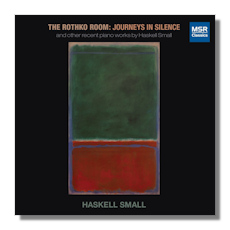
The Internet's Premier Classical Music Source
Related Links
- Latest Reviews
- More Reviews
-
By Composer
-
Collections
DVD & Blu-ray
Books
Concert Reviews
Articles/Interviews
Software
Audio
Search Amazon
Recommended Links
Site News
 CD Review
CD Review
Haskell Small

The Piano Music
- The Rothko Room: Journeys in Silence
- Visions of Childhood
- A Glimpse of Silence
Haskell Small, piano
MSR Classics MSR1497
You really like to get these kinds of discs in the mail. A composer playing his own music on a small label always has appeal, this project was an entirely worthy one. Haskell Small (born 1948) is an accomplished pianist and teacher whose own works show a great deal of emotional depth and creativity. The pieces here are currently on tour throughout the US, making this release both timely and musically important. Beautifully recorded on Haskell's Steinway, piano fans looking for something different should find much to enjoy here.
Inspired by the paintings of Mark Rothko, and specifically those in the Phillips Collection in Washington D.C., Journeys in Silence is a startlingly vivid biography of the artists' troubled life. There is angst and pain here, but also great reflection and beauty. The work is huge, nearly a half-hour in length, but captures the ear all the way through. Part of that is undoubtedly because it lives up to its title; the use of silence in this music is effective and adds to the considerable drama and tension. Small is magnificent. In a big piece like this – big, but without many virtuoso passages – the key is emotional involvement and dynamic contrast. To his credit, he's able to give his output a real sense of discovery and purpose. The result is exceptionally fine, although it may prove difficult listening at first and probably isn't a piece you'd play all over again right away.
Inspired at least in part by Robert Schumann's Scenes from Childhood, Small's Visions of Childhood is much more challenging as a listen, but certainly shares some characteristics. These 10 short movements do have the requisite sense of whimsy and adventure to be childlike, but there are darker and more menacing colors here, these aren't pieces for children. Rather, they are reflections on the things that all of us can relate to from an adult lens. The result is fascinating; there is nostalgia, yes, but also regret and pain. It's very human music, if I can say that. Small captures each subtitle with a great depth of feeling and generosity of spirit. Again, it isn't an easy listen; it's just a good one.
Ending the album is A Glimpse of Silence. Written in 2013, it's the newest, shortest, and most ambiguous work on the disc. The notes compare it to a music box; fair enough, but music boxes don't generally hold my attention for eight minutes. This does, thankfully, and again there is so much color and drama, not only in the music but in the lack of music, that this is successful. As in the first piece on the program, the silence really works well. As the piece fades away, we are reminded that before, after, and during music, there is nothing but silence. Haskell Small uses it to his distinct advantage, creating a recital that is thought-provoking and makes us look at the importance of silence in our childhood, adulthood, and perhaps beyond. This is a very difficult disc, but one with tremendous rewards.
Copyright © 2014, Brian Wigman




















